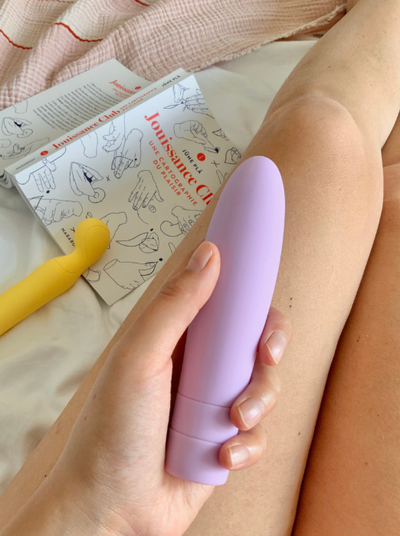According to Debby Herbenick, professor at the Indiana University School of Public Health, good sex for women is the absence of pain, not the occurrence of pleasure. The scale we use to evaluate our sexual experience is telling. Women’s pleasure remains the biggest taboo, and the fact is that, we, women, don’t even take such an interest in it when we assess our sexual satisfaction.
But to be fair, we’re hardly encouraged and educated to do so.
Entitled to pleasure?
We highly recommend watching Peggy Orenstein’s Ted Talk on young women’s beliefs about their own pleasure. Peggy Orenstein’s has researched, among other things, the attitudes and experiences of sex for girls between 15 and 20. What she found striking was that, although young women feel entitled to having a sex life, they do not seem to see themselves as entitled to enjoy it.
In her work, Dr Sara McClelland at University of Michigan found that “young women are more likely than young men to use their partner’s pleasure as a measure of their satisfaction.” Talking about women’s capacity for and entitlement to sexual pleasure remains a very strong taboo that is perpetuated by yet another taboo: naming women’s genitals.
Vulva shame.
Sex education and anatomy classes in high-school have a very limited take on sexual anatomy. As Peggy Orenstein puts it “Boys have erections and ejaculations, girls have periods and unwanted pregnancies.” And when it comes to sexual behavior, the conversation ends at the topic of consent. Which, by all means, is absolutely necessary and if anything, should be hammered home. But sex starts at consent, it doesn’t end there. What do we say to girls besides talking to them about contraception and STDs?
Do we tell them that clitorises also have erections or that Skene glans can secrete ejaculatory liquid? We’re pretty sure your sex ed anatomy classes did not linger too long on the vulva, let alone the clitoris or the topic of female ejaculation. There is no more efficient way to make something unspeakable than not to name it. We build in young girls a sense of shame around their genitals that fuels a billion-rich industry and has also a dramatic and tragic impact into how women relate to their private parts.
So, let’s name them!

How we know (not) of our pleasure anatomy.
A survey led by the UK gynaecological cancer charity, Eve Appeal, found that women are more familiar with men’s bodies than their own: while 60% can correctly label a diagram of the male body, just 35% correctly labeled female anatomy (Don’t ask how men scored…). Studies done among college-age women in the US showed consistent results. We don’t know our sexual anatomy well enough.
This translates, with other factors, in a lower interest for masturbation. Fewer than half of girls age between 14 to 17 in the US have never masturbated. Imagine if we told you that half of teenage boys don’t masturbate, would you believe us? And it’s not just teens. A survey conducted by Indiana University about masturbation habits for men and women in the United States, showed that the frequency of masturbation for men is always higher than women’s.
We are not taught to explore our sexual anatomy, because it remains an unnamed thing told to be smelly and unbecoming. As a result, with a partner, it makes it more complicated to express our needs and desires.
Sexuality is a source of self-knowledge: of our body, but not only. During sex, how we see ourselves, how we respect ourselves and our partner(s), how we enjoy ourselves plays out. That’s why it is so important to allow a healthy, respectful and comprehensive conversation about it. And we know where to start: the longstanding stigma over female sexual pleasure leaves many questions unanswered, but not unasked.
Real questions we have about sex.
We get a lot of questions from women about sex. Spoiler alert: the most popular one is not “How can I make him come?”.
It’s any version of “Why can’t I have an orgasm?”: “Why can’t I get vaginal orgasms?”, “Why don’t I feel pleasure with my partner but I do by myself?”, “Why can I orgasm from oral sex but not from penetration?”. All these are real questions we have actually received from real persons.
All these questions also highlight a problem of definition: sex education, by not going into more details when it comes to sexual behavior, doesn’t address the social construct that sex = penetration. As a result of this construct, Peggy Orenstein has observed that young girls do not see a blow job as sex. This ties back to the taboo around female anatomy and female pleasure, and to using partner’s satisfaction as a measure of one’s own sexual satisfaction. If sex equals penetration and male orgasm equals success, where does that leave our pleasure if we are not a penis-haver and/or not heterosexual?
We walk the Vulva Talks!
What we see at events, workshops, or via private messages, is that people crave a more open, inclusive and realistic conversation about sex. There’s a need to find reliable and relatable information about sex that is, needless to say, not porn, but also not scientific jargon nor mainstream media click bait content.
That’s why we want to deconstruct women’s pleasure as an unspeakable topic and sex as a heterosexual practice centered around penetration.
Launching Vulva Talks for all things vulva, our pleasure-positive sex education program focuses on female sexuality and has been developed by gathering questions women have about sex, and the expert replies of sexologists.







